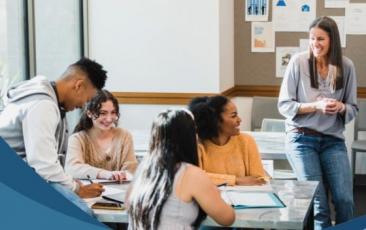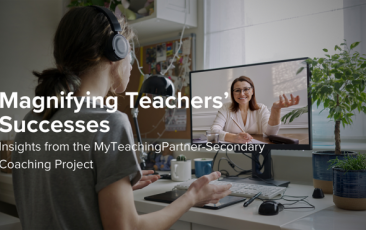Rethink Professional Learning: Mentoring, Induction, and Beyond | GTL Center

Rethink Professional Learning Systems to Meet the Needs of Today's Educators and Students
Educators need professional growth supports that meet them exactly where they are in their career and helps them to meet their students' unique needs.
New teachers entering the profession from alternative pathways need more intensive coaching and supports. Mid-career teachers need opportunities to take risks, refine and extend their strengths, and support their career aspirations. Veteran teachers need targeted opportunities that help them to meet the needs of today's schools and students, which may be quite different from the preparation they originally received, while also extending the reach of their experience and skills.
Professional learning systems that are structured, but responsive, and that prioritize teacher empowerment, are a core policy lever for creating an effective, diverse, and sustainable educator workforce.
Explicitly designing key professional learning programs, such as mentoring and induction programs, to support both alternative pathways into the profession and strategic staffing models builds a bridge towards a workforce ecosystem that is sustainable, responsive, and able to meet the needs of today's classrooms.
Explore our resources and find actionable insights and practical tools to rethink your educator professional learning system.
Top Resources

Mentoring and Induction Toolkit 2.0: Supporting Teachers in Underserved Contexts
States can use this toolkit to facilitate meaningful conversations with districts about design and implementation for teacher mentoring and induction programs, particularly in underserved contexts. The toolkit includes summaries of research and best practices, relevant examples, and a streamlined action planning process.

Evidence-Based Practices to Support Equity: A Snapshot on Mentoring and Induction (2019)
To make informed policy decisions, use this snapshot to understand the basics of mentoring and induction strategies, including how states and districts have implemented these strategies and the empirical studies and evidence that demonstrate the effect of the strategies on educator and student outcomes.

Self-Assessing Social and Emotional Instruction and Competencies: A Tool for Teachers
The educational community is increasingly focused on the development of students’ social and emotional learning (SEL) competencies and the link between SEL and improved educational attainment and achievement. This self-assessment tool is designed to help educators reflect upon (1) their current teaching practices that impact student SEL, and (2) their own SEL competencies to implement those teaching practices.

Magnifying Teachers' Successes: Insights from the MyTeachingPartner-Secondary Coaching Project
MyTeachingPartner is a web-mediated, strengths-based instructional coaching program that works to help teachers improve the quality of classroom interactions to boost student engagement and academic achievement. Explore insights from the program in our interactive story.
Featured Project

A Meta-Analysis: How Learning Forward's Professional Learning Standards Are Associated with Teacher Instruction and Student Achievement (December 2021)
In collaboration with MOSAIC, we conducted a systematic review and meta-analysis to examine the effects of professional development programs, particularly program features aligned with Learning Forward's Professional Learning Standards, on teacher instruction and student outcomes.

Mentoring and Induction in Underserved Schools
As part of the GTL Center's Mentoring and Induction Affinity Group, the Indiana Department of Education and the Kokomo School Corporation participated in a series of six in-person and virtual workshops that supported the development of resources and processes to develop and implement a comprehensive teacher induction program. Outside the workshops, the team met regularly and used knowledge-building activities and resources from the GTL Center's Mentoring and Induction Toolkit 2.0 to facilitate a data dive, root cause analysis, induction program inventory, and other activities.

